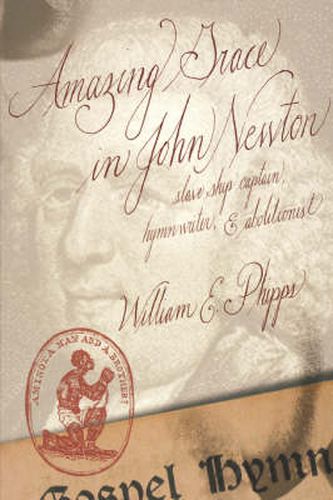Readings Newsletter
Become a Readings Member to make your shopping experience even easier.
Sign in or sign up for free!
You’re not far away from qualifying for FREE standard shipping within Australia
You’ve qualified for FREE standard shipping within Australia
The cart is loading…






In Amazing Grace, the best-loved of all hymns, John Newton’s allusions to the drama of his life tell the story of a youth who was a virtual slave in Sierra Leone before ironically becoming a slave trader himself. Liverpool, his home port, was the center of the most colossal, lucrative, and inhumane slave trade the world has ever known. A gradual spiritual awakening transformed Newton into an ardent evangelist and antislavery activist.Influenced by Methodists George Whitefield and John Wesley, Newton became prominent among those favoring a Methodist-style revival in the Church of England. This movement stressed personal conversion, simple worship, emotional enthusiasm, and social justice. While pastor of a poor flock in Olney, he and poet William Cowper produced a hymnal containing such perennial favorites as Glorious Things of Thee Are Spoken and God Moves in a Mysterious Way. Later, while serving a church in London, Newton raised British consciousness on the immorality of the slave trade. The account he gave to Parliament of the atrocities he had witnessed helped William Wilberforce obtain legislation to abolish the slave trade in England.Newton’s life story convinced many who are found after being lost to sing Gospel hymns as they lobbied for civil rights legislation. His close involvement with both capitalism and evangelicalism, the main economic and religious forces of his era, provide a fascinating case study of the relationship of Christians to their social environment. In an afterword on Newtonian Christianity, Phipps explains Newton’s critique of Karl Marx’s thesis that religious ideals are always the effect of what produces the most profit. Phipps relies on accountsNewton gives in his ship journal, diary, letters, and sermons for this most readable scholarly narrative.
$9.00 standard shipping within Australia
FREE standard shipping within Australia for orders over $100.00
Express & International shipping calculated at checkout
In Amazing Grace, the best-loved of all hymns, John Newton’s allusions to the drama of his life tell the story of a youth who was a virtual slave in Sierra Leone before ironically becoming a slave trader himself. Liverpool, his home port, was the center of the most colossal, lucrative, and inhumane slave trade the world has ever known. A gradual spiritual awakening transformed Newton into an ardent evangelist and antislavery activist.Influenced by Methodists George Whitefield and John Wesley, Newton became prominent among those favoring a Methodist-style revival in the Church of England. This movement stressed personal conversion, simple worship, emotional enthusiasm, and social justice. While pastor of a poor flock in Olney, he and poet William Cowper produced a hymnal containing such perennial favorites as Glorious Things of Thee Are Spoken and God Moves in a Mysterious Way. Later, while serving a church in London, Newton raised British consciousness on the immorality of the slave trade. The account he gave to Parliament of the atrocities he had witnessed helped William Wilberforce obtain legislation to abolish the slave trade in England.Newton’s life story convinced many who are found after being lost to sing Gospel hymns as they lobbied for civil rights legislation. His close involvement with both capitalism and evangelicalism, the main economic and religious forces of his era, provide a fascinating case study of the relationship of Christians to their social environment. In an afterword on Newtonian Christianity, Phipps explains Newton’s critique of Karl Marx’s thesis that religious ideals are always the effect of what produces the most profit. Phipps relies on accountsNewton gives in his ship journal, diary, letters, and sermons for this most readable scholarly narrative.